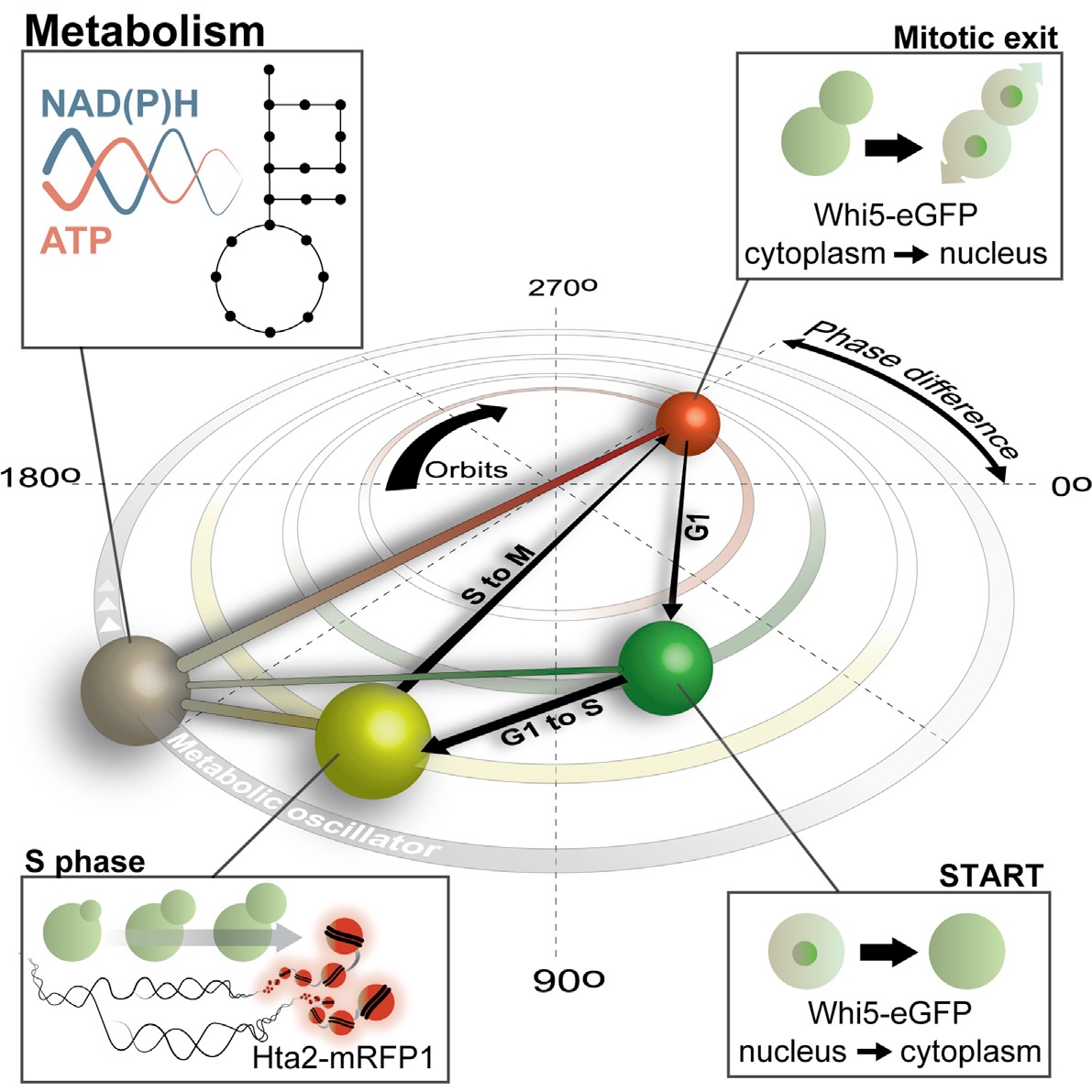New research paper challenges dogma of cell cycle control
All textbooks describe the cyclin-dependent kinase complex as the one and only/exclusive regulator of the eukaryotic cell cycle. But now University of Groningen scientists have found evidence that a metabolic oscillator acts as the “conductor” of cell division. Their results were published online in the journal Molecular Cell on December 15.
Cells go through repetitive cycles of DNA duplication, growth, and cell division. These cycles require the careful coordination of cell-processes checkpoints that prevent cells from dividing when something – DNA duplication, for example – has gone wrong. The cyclin-dependent kinase complex was identified as the regulator of these cell cycles, and in 2001 the Nobel Prize for Physiology or Medicine was awarded for this discovery.
Not the complete story
“But there were signs that this wasn’t the complete story,” says University of Groningen system biologist Matthias Heinemann. One sign was the fact that cells can divide, even when parts of the cyclin-dependent kinase complex are removed. Heinemann reasoned that metabolic oscillations might set the pace for cell division. “We knew that metabolism often oscillated in synchrony with the cell cycle. So maybe, this was an autonomous control mechanism.”
Under the microscope
Heinemann studied budding yeast cells cultivated in microfluidic channels. With that method, single cells could be monitored for days under the microscope. By using fluorescence techniques, it was possible to measure the concentration of two markers of metabolism: the electron carrier NADH and the energy carrier ATP. These molecules showed clear oscillatory patterns, rhythms that usually beat in synchrony with the cell cycle. Heinemann added, “But we also noticed that occasionally cells did not divide, and that these cells still showed metabolic oscillations.”
Orchestra and conductor
So metabolism turned out to be a cell cycle-independent oscillator, which would oscillate fast if cells were well fed; poor nutrition, on the other hand, reduced the pace. “We argue that metabolism and the cyclin-dependent kinase complex are coupled oscillators, which together orchestrate the growth and division of eukaryotic cells.” Or, in other words, the cyclin-dependent kinase complex is the orchestra, while the metabolic oscillations beat the rhythm, like a conductor does.
Uncoupled
“But when metabolism is slowed down or sped up too much, the cell cycle can’t keep up and stops,” says Heinemann. Both oscillations have their own natural frequency, and, under normal circumstances, these two oscillations are coupled and compromise with each other at a common frequency, which then governs the cell division process. Further experiments showed that the metabolic and the cell cycle oscillators could in fact be uncoupled.

View too narrow
Biologists may have to change the way they view cell cycle regulation. “The current view is too narrow and cannot explain why cells still divide when part of the cyclin-dependent kinase complex is removed.” A leading role played by metabolism also makes sense from an evolutionary perspective: “You would expect the earliest cells or proto-cells to have a simple control system to regulate division, and metabolism would be the obvious candidate.”
Tumor cells
This new perspective could eventually be of clinical significance. “Most tumor cells have a very high metabolism. Interfering with metabolic processes could be a way to stop them from proliferating.”
Further information
- Reference: Alexandros Papagiannakis, Bastian Niebel, Ernst C. Wit, and Matthias Heinemann: “Autonomous Metabolic Oscillations Robustly Gate the Early and Late Cell Cycle.” Molecular Cell, December 15, 2016, DOI 10.1016/j.molcel.2016.11.018
| Last modified: | 14 April 2020 10.51 a.m. |
More news
-
03 April 2025
IMChip and MimeCure in top 10 of the national Academic Startup Competition
Prof. Tamalika Banerjee’s startup IMChip and Prof. Erik Frijlink and Dr. Luke van der Koog’s startup MimeCure have made it into the top 10 of the national Academic Startup Competition.
-
01 April 2025
NSC’s electoral reform plan may have unwanted consequences
The new voting system, proposed by minister Uitermark, could jeopardize the fundamental principle of proportional representation, says Davide Grossi, Professor of Collective Decision Making and Computation at the University of Groningen
-
01 April 2025
'Diversity leads to better science'
In addition to her biological research on ageing, Hannah Dugdale also studies disparities relating to diversity in science. Thanks to the latter, she is one of the two 2024 laureates of the Athena Award, an NWO prize for successful and inspiring...
